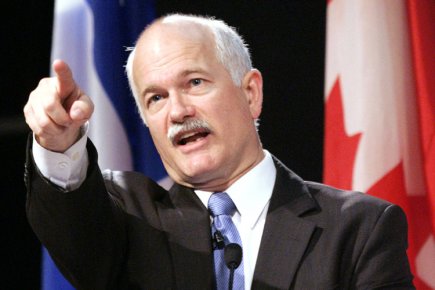Don't Dianify Jack Layton

The funeral is done, the mourning crowds have dispersed, the media has turned to other things – but in the wake of Jack Layton’s too-early death at age 61, he has somehow become an icon, sanctified as a symbol for a better Canada.
By dying at the peak of his political career, before he’d achieved much, the country went a little bonkers. Prime Minister Harper ordered a state funeral which, while generous and popular, was quite unnecessary.
Eulogies and tributes to “Jack” are more emotional outbursts than thoughtful assessments: A happy warrior on the wrong side of history.
One doesn’t want to speak ill of the dead, so let it be with Layton. But bathing the CN Tower in Orange, and the same orange for Niagara Falls, are simply gestures of emotionalism that suddenly made fashionable for Layton.
Virtually everyone mentions his “common touch,” and his generosity by attending functions, and his empathy with those enduring misfortune. That sort of thing – commendable, but then he was a professional politician.
As a politician, what did Jack Layton achieve?
His greatest glory was his last year of life (hence the sorrowful adulation) when in the general election the Quebec Liberals and the Bloc Quebecois fumbled big-time. Quebec voters flocked to the NDP.
No question, Layton’s cheery style, charisma, buoyant courage in the face of cancerous adversity, were outstanding qualities that attracted the disaffected of Quebec. For the time being.
As has been said: Courage, even by one’s (political) foes, is attractive. Jack Layton showed considerable courage in his final campaign.
But what did he achieve? How is Canada better because of him? And what about his “common touch” that seems to have mesmerized so many?
Where was the “common touch” when he ran for Mayor of Toronto in 1991, and lost to June Rowlands? She got 58.5% of the vote, he got 32.8%.
We tend to forget that Jack Layton was instrumental for Toronto losing the 1996 bid for the Summer Olympics – maybe a good thing in retrospect, but an issue of controversy and embarrassment at the time.
Where was the “common touch” when he ran for Parliament in 2003, finished fourth with 11% of the vote, while Bill Graham won with 50%?
And where was the “common touch” in 1997 when Layton finished second with 32% to winner Dennis Mills’ 49.7%?
It would seem the “common touch” (and there’s no disputing it at the end) arrived after Layton became NDP leader in 2003, and then was elected to Parliament in 2004. As leader he did well (and the NDP steadily gained) but was going nowhere until Quebeckers became dissatisfied.
So what was it Layton achieved? Very little. A career politician, he never had the chance to lead his party when it became the Official Opposition for the first time in Canada’s history.
His one act, as leader of the Official Opposition, was to appoint a separatist to be interim leader. Then he died. And the nation mourned–not quite certain why the grief, but every one else was doing it.
What happens now with the NDP?
Would it not be appropriate for Jack’s widow, Olivia Chow, to bid for party leadership? It’s happened before in other places (Evita Peron?) and she’s certain ambitious and smart -- even though she may not (yet) have the “common touch” that distinguished Jack.

